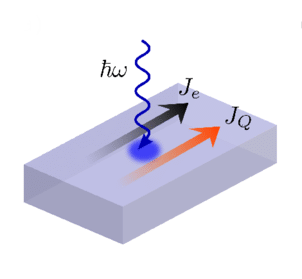Shift current: Difference between revisions
No edit summary |
|||
| Line 37: | Line 37: | ||
NLLrcAlpha= 0.000000 # [NL] Long Range Correction | NLLrcAlpha= 0.000000 # [NL] Long Range Correction | ||
% NLEnRange | % NLEnRange | ||
<span style="color:red"> 1.000000 | | <span style="color:red"> 1.000000 | 8.000000 </span> | eV # [NL] Energy range (for loop on frequencies NLEnSteps/=0 | ||
% | % | ||
NLEnSteps= <span style="color:red"> | NLEnSteps= <span style="color:red">48 </span> # [NL] Energy steps for the loop on frequencies | ||
% NLrotaxis | % NLrotaxis | ||
0.000000 | 0.000000 | 0.000000 | # [NL] Rotation axis (for the loop on angles NLAngSteps/=0) | 0.000000 | 0.000000 | 0.000000 | # [NL] Rotation axis (for the loop on angles NLAngSteps/=0) | ||
Revision as of 09:11, 9 July 2024
This tutorial is for internal use only, these response functions are not implemented/tested in yambo/yambopy suite.
Introduction
In this tutorial we will show how to calculate Shift Current in bulk materials.
We suppose you are already familiar with the non-linear response using the Yambo code.
If it is not the case please study the previous tutorials:
Linear response using Dynamical Berry Phase and Real time approach to non-linear response (SHG).
Setup calculations
In this tutorial we will take as example the two dimensional hBN.
DFT wave-functions and inputs can be downloaded here: hBN-2D-RT.tar.gz.
First of all run the setup, then remove symmetries along the y direction, as explained in the tutorial above.
Real-time setup and calculations
In order to generate input file for shift current you do: yambo_nl -u n -V par
nloptics # [R] Non-linear spectroscopy
NLogCPUs=0 # [PARALLEL] Live-timing CPU`s (0 for all)
PAR_def_mode= "balanced" # [PARALLEL] Default distribution mode ("balanced"/"memory"/"workload"/"KQmemory")
NL_CPU= " 8 1" # [PARALLEL] CPUs for each role
NL_ROLEs= " w k" # [PARALLEL] CPUs roles (w,k)
DIP_CPU= "" # [PARALLEL] CPUs for each role
DIP_ROLEs= "" # [PARALLEL] CPUs roles (k,c,v)
OSCLL_CPU= "" # [PARALLEL] CPUs for each role
OSCLL_ROLEs= "" # [PARALLEL] CPUs roles (k,b)
DIP_Threads=0 # [OPENMP/X] Number of threads for dipoles
NL_Threads=0 # [OPENMP/NL] Number of threads for nl-optics
OSCLL_Threads=0 # [OPENMP/X] Number of threads for Oscillators
% NLBands
3 | 6 | # [NL] Bands range
%
NLverbosity= "high" # [NL] Verbosity level (low | high)
NLtime=-1.000000 fs # [NL] Simulation Time
NLintegrator= "INVINT" # [NL] Integrator ("EULEREXP/RK2/RK4/RK2EXP/HEUN/INVINT/CRANKNIC")
NLCorrelation= "IPA" # [NL] Correlation ("IPA/HARTREE/TDDFT/LRC/LRW/JGM/SEX/LSEX/LHF")
NLLrcAlpha= 0.000000 # [NL] Long Range Correction
% NLEnRange
1.000000 | 8.000000 | eV # [NL] Energy range (for loop on frequencies NLEnSteps/=0
%
NLEnSteps= 48 # [NL] Energy steps for the loop on frequencies
% NLrotaxis
0.000000 | 0.000000 | 0.000000 | # [NL] Rotation axis (for the loop on angles NLAngSteps/=0)
%
NLAngSteps=0 # [NL] Angular steps (if NLAngSteps/=0 field versor will be ignored)
NLDamping= 0.200000 eV # [NL] Damping (or dephasing)
RADLifeTime=-1.000000 fs # [RT] Radiative life-time (if negative RADLifeTime=Phase_LifeTime)
EvalCurrent # [NL] Evaluate the current
#FrPolPerdic # [DIP] Force periodicity of polarization respect to the external field
% Field1_Freq
0.100000 | 0.100000 | eV # [RT Field1] Frequency
%
Field1_NFreqs= 1 # [RT Field1] Frequency
Field1_Int= 1000.00 kWLm2 # [RT Field1] Intensity
Field1_Width= 0.000000 fs # [RT Field1] Width
Field1_kind= "SOFTSIN" # [RT Field1] Kind(SIN|SOFTSIN| see more on src/modules/mod_fields.F)
Field1_pol= "linear" # [RT Field1] Pol(linear|circular)
% Field1_Dir
0.000000 | 1.000000 | 0.000000 | # [RT Field1] Versor
%
Field1_Tstart= 0.010000 fs # [RT Field1] Initial Time
Notice that in this input we turned one the evaluation of current EvalCurrent and force the parallelization on the frequencies, NL_CPU= " 8 1, NL_ROLEs= " w k , that is much more efficient than the one on k-points.
